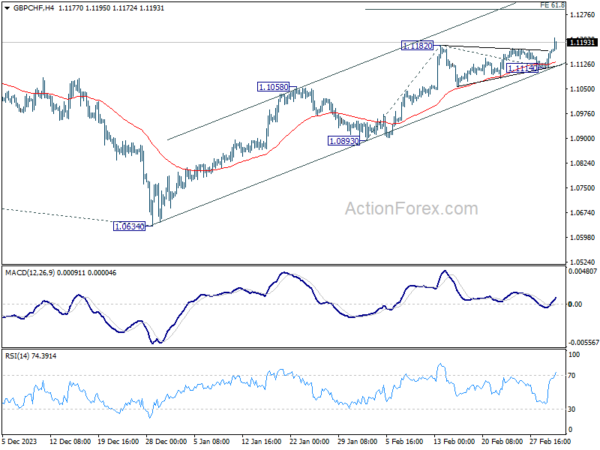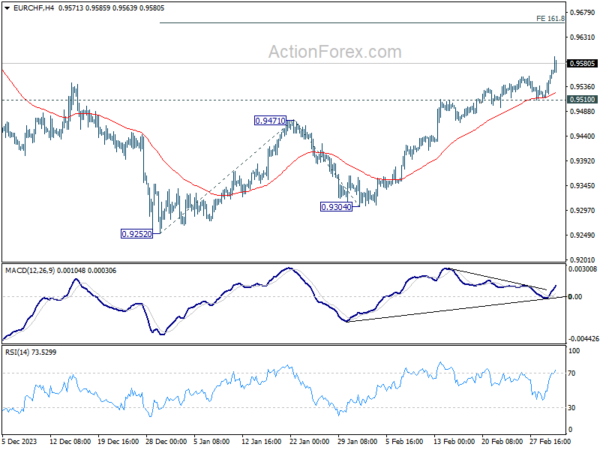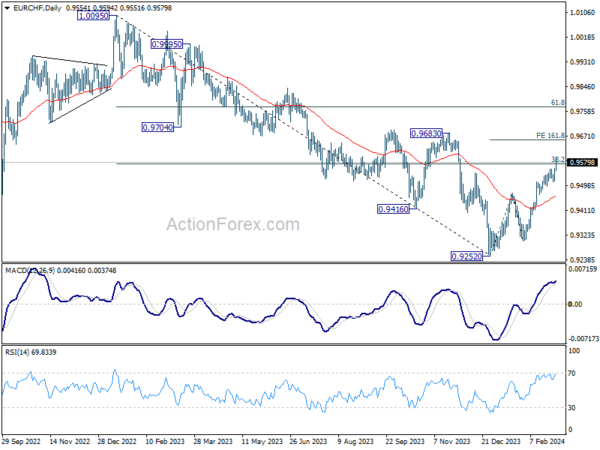Euro rises broadly today even though gains are so far limited. The common currency is lifted by stronger than anticipated Eurozone inflation figures, which suggests that the path to disinflation may be encountering obstacles. This development could providing ammunition to hawks within the ECB Governing Council, to advocate for a cautious approach towards rate cuts.
Governing Council member Robert Holzmann’s remarks underscored this sentiment, emphasizing the need for patience and caution in monetary policy decisions: “we have to wait” and “cannot rush to a decision”. Holzmann’s timing, however, raises eyebrows as it comes during ECB’s quiet period before its upcoming meeting less than a week away.
Overall in the currency markets, Yen and Swiss Franc are trailing as the day’s underperformers, with Dollar also softening slightly. Conversely, Australian Dollar the second best just behind Euro, followed by Sterling, while Canadian Dollar is mixed in tandem with the New Zealand Dollar.
Technically, as a follow up to the Daily Report today, GBP/CHF’s break of 1.1182 resistance confirms resumption of whole rise from 1.0634. Next target is 61.8% projection of 1.0893 to 1.1182 from 1.1114 at 1.1293. Now, a focus is on whether USD/CHF could follow by breaking through 0.8884 resistance.
In Europe, at the time of writing, FTSE is up 0.68%. DAX is up 0.51%. CAC is up 0.01%. UK 10-yaer yield is up 0.0285 at 4.250. Germany 10-year yield is up 0.032 at 2.447. Earlier in Asia, Nikkei surged 1.90%. Hong Kong HSI rose 0.47%. China Shanghai SSE rose 0.39%. Singapore Strait Times fell -0.19%. Japan 10-year JGB yield rose 0.0060 to 0.720.
Eurozone CPI slows to 2.6%, core down to 3.1%, both above expectations
Eurozone CPI slowed from 2.8% yoy to 2.6% yoy in February, above expectation of 2.5% yoy. CPI core (ex-energy, food, alcohol & tobacco) slowed from 3.3% yoy to 3.1% yoy, above expectation of 2.9% yoy.
Breaking down the main components, food, alcohol & tobacco is expected to have the highest annual rate in February (4.0%, compared with 5.6% in January), followed by services (3.9%, compared with 4.0% in January), non-energy industrial goods (1.6%, compared with 2.0% in January) and energy (-3.7%, compared with -6.1% in January).
Eurozone PMI manufacturing finalized at 46.5, one-year industrial recession not ending yet
Eurozone PMI Manufacturing was finalized at 46.5 in February, down slightly from January’s 46.6.
Greece, Ireland, and Spain notably marked significant highs in their manufacturing PMI, with Greece reaching a 24-month high at 55.7, Ireland a 20-month high at 52.2, and Spain entering growth territory with a 20-month high at 51.5.
These figures contrast starkly with the larger economies within such as Germany and France, where manufacturing activity continued to contract, with Germany hitting a 4-month low at 42.5, and France at 11-month high at 47.1.
Cyrus de la Rubia, Chief Economist at Hamburg Commercial Bank, stated the Eurozone’s “industrial recession” extends beyond a year without signs of abating. The continued decline in output, particularly in the region’s economic powerhouses Germany and France, underscores the persistent challenges facing the manufacturing sector.
Despite the overall contraction, there’s a “glimmer of hope” as the pace of decline in new orders across Eurozone has softened. This slight improvement suggests that demand conditions could be stabilizing, potentially laying the groundwork for a gradual recovery in the manufacturing sector.
UK PMI manufacturing finalized at 47.5, impacts of Red Sea crisis continue
UK PMI Manufacturing was finalized at 47.5 in February, up from January’s 47.0. This marks the highest reading since April 2023, yet the sector has been contracting for 19 consecutive months.
Rob Dobson, Director at S&P Global Market Intelligence, said the impact of the Red Sea crisis was particularly pronounced, causing delays in raw material deliveries, inflating purchase prices, and impairing production capabilities. This crisis also had a knock-on effect on demand, with new export orders suffering due to supply chain disruptions and escalated shipping costs.
The crisis has exerted considerable pressure on both prices and supplies. Input cost inflation reached an 11-month high, necessitating further increases in selling prices, while average supplier lead times extended to the greatest extent since mid-2022.
Dobson suggests that this inflationary pressure may prompt policymakers to reconsider the timing of anticipated interest rate cuts, hinting at the broader economic implications of the manufacturing sector’s current challenges.
BoJ’s Ueda stays cautious on achieving sustainable inflation
Bank of Japan Governor Kazuo Ueda reiterated that Japan has not yet achieved sustainable 2% inflation. “I don’t think we are there yet,” he said after G20 finance ministers’ meeting.
A significant focus for BoJ in the near term will be the outcome of upcoming annual wage negotiations between companies and unions. Ueda pointed out the importance of these negotiations in determining the potential for a positive wage-inflation cycle in Japan.
“We need to confirm whether a positive wage-inflation cycle would kick off and strengthen,” he noted, acknowledging the rising demands from unions for pay increases exceeding last year’s and the apparent willingness among many firms to comply.
However, Ueda also stressed the need for a comprehensive review of the collective results of these wage negotiations, alongside other economic data, to gauge whether wages and inflation will sustainably rise in tandem.
Japan’s PMI manufacturing finalized at 47.2, worst since Aug 2020
Japan’s PMI Manufacturing was finalized at 47.2 in February, down from January’s 48.0. This marks the ninth consecutive month of contraction, presenting the most significant downturn since August 2020.
According to S&P Global, the decline was characterized by sharper falls in both output and new orders. Additionally, the sector experienced the most substantial decline in employment seen in over three years, indicating that the downturn is having a tangible impact on workforce. Furthermore, rate of increase in output prices slowed to the lowest level since June 2011, suggesting that price pressures are easing amid weakened demand.
China’s NBS PMI manufacturing falls slightly to 49.1, Caixin manufacturing rises to 50.9
China’s manufacturing sector continued its contraction for the fifth consecutive month in February, with official NBS PMI decreasing slightly from 49.2 to 49.1, matched expectations.
New orders subindex remained steady at 49, indicating stagnant demand. New export orders fell further from 47.2 to 46.3, reflecting ongoing pressures on the export front.
NBS PMI Non-Manufacturing rose from 50.7 to 51.4 , surpassing the anticipated 50.8. PMI Composite remained unchanged at 50.9.
In parallel, Caixin PMI Manufacturing, which focuses more on small and medium-sized enterprises, edged up from 50.8 to 50.9 , slightly above expectations of 50.7.
Caixin noted sustained increase in output and new orders, with firms expressing improved business optimism for the second consecutive month. Additionally, input cost inflation declined to a seven-month low, while selling prices fell.
RBNZ’s Orr: Restrictive policy to stay, expects normalization next year
RBNZ Governor Adrian Orr affirmed today that the economy is “evolving as anticipated”, with inflation expectations declined. However, he reiterated inflation “is still too high”.
The governor emphasized the necessity of maintaining a restrictive monetary policy stance “for some time.” He added that he expects to “begin normalizing policy in 2025.”
EUR/CHF Mid-Day Outlook
Daily Pivots: (S1) 0.9529; (P) 0.9545; (R1) 0.9574; More…
EUR/CHF’s rally re-accelerates today and breaks through 0.9575 fibonacci resistance. There is no sign of topping yet and intraday bias stays on the upside. Next target will be 161.8% projection of 0.9252 to 0.9471 from 0.9304 at 0.9658 next. For now, further rally is expected as long as 0.9510 support holds, in case of retreat.
In the bigger picture, price actions from 0.9252 are tentatively seen as a correction to the five-wave down trend from 1.0095 (2023 high). 38.2% retracement of 1.0095 to 0.9252 at 0.9574is already met. But overall medium term outlook will remain bearish as long as 0.9683 resistance holds.
Economic Indicators Update
| GMT | Ccy | Events | Actual | Forecast | Previous | Revised |
|---|---|---|---|---|---|---|
| 21:45 | NZD | Building Permits M/M Jan | -8.80% | 3.70% | 3.60% | |
| 23:30 | JPY | Unemployment Rate Jan | 2.40% | 2.40% | 2.40% | |
| 00:30 | JPY | Manufacturing PMI Feb F | 47.2 | 47.2 | 47.2 | |
| 01:00 | CNY | NBS Manufacturing PMI Feb | 49.1 | 49.1 | 49.2 | |
| 01:00 | CNY | NBS Non-Manufacturing PMI Feb | 51.4 | 50.8 | 50.7 | |
| 01:45 | CNY | Caixin Manufacturing PMI Feb | 50.9 | 50.7 | 50.8 | |
| 05:00 | JPY | Consumer Confidence Index Feb | 39.1 | 38.4 | 38 | |
| 07:30 | CHF | Real Retail Sales Y/Y Jan | 0.30% | 0.40% | -0.80% | -0.10% |
| 08:30 | CHF | Manufacturing PMI Feb | 44 | 44.6 | 43.1 | |
| 08:45 | EUR | Italy Manufacturing PMI Feb | 48.7 | 49.5 | 48.5 | |
| 08:50 | EUR | France Manufacturing PMI Feb F | 47.1 | 46.8 | 46.8 | |
| 08:55 | EUR | Germany Manufacturing PMI Feb F | 42.5 | 42.3 | 42.3 | |
| 09:00 | EUR | Italy Unemployment Jan | 7.20% | 7.20% | 7.20% | |
| 09:00 | EUR | Eurozone Manufacturing PMI Feb F | 46.5 | 46.1 | 46.1 | |
| 09:30 | GBP | Manufacturing PMI Feb F | 47.5 | 47.1 | 47.1 | |
| 10:00 | EUR | Eurozone Unemployment Rate Jan | 6.40% | 6.40% | 6.40% | |
| 10:00 | EUR | CPI Y/Y Feb P | 2.60% | 2.50% | 2.80% | |
| 10:00 | EUR | CPI Core Y/Y Feb P | 3.10% | 2.90% | 3.30% | |
| 14:30 | CAD | Manufacturing PMI Feb | 48.3 | |||
| 14:45 | USD | Manufacturing PMI Feb F | 51.5 | 51.5 | ||
| 15:00 | USD | ISM Manufacturing PMI Feb | 49.5 | 49.1 | ||
| 15:00 | USD | ISM Manufacturing Prices Paid Feb | 52 | 52.9 | ||
| 15:00 | USD | ISM Manufacturing Employment Index Feb | 47.1 | |||
| 15:00 | USD | Construction Spending M/M Jan | 0.10% | 0.90% | ||
| 15:00 | USD | Michigan Consumer Sentiment Index Feb F | 79.6 | 79.6 |



